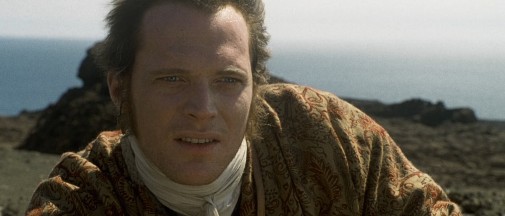
Paul Bettany's one of those actors who feels like an Oscar nominee despite having never received love from the Academy. Since the late 90s, the British thespian has starred in various awards-friendly titles, including a Best Picture winner, and is regularly praised by critics even when his projects disappoint. Nonetheless, AMPAS always ignores him. His best shot came in 2003 when his supporting turn in Peter Weir's Master & Commander: The Far Side of the World earned him some well-deserved buzz. Since the actor just celebrated his 50th birthday, I chose to celebrate the occasion by looking back at that performance in a special entry to the Almost There series…
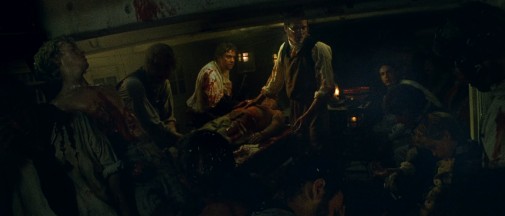
Adapted from several of Patrick O'Brian's Aubrey-Maturin novels, Master & Commander revolves around the crew of HMS Surprise during the Napoleonic Wars. In 1805, the British Royal Navy ship pursues the Acheron, a French privateer, with orders to destroy the enemy. Like Michael Cusumano wrote in his The New Classics article, the movie has an Altman-esque quality, a love for portraying the communal existence of a group rather than the story of the individual hero. There's obstinate defiance to how it denies the audience an easy entry point into the recreation of a historical past. Instead, the picture drops us right into the action with no guiding avatar nor a script interested in emotional storytelling.
Nevertheless, there's a main character in this feature: Captain Jack Aubrey, whose commitment to the mission is reaching Ahab-like levels of intensity, perchance obsession. Serving as necessary temperance to Aubrey's militaristic perspective, Dr. Stephen Maturin is the ship's surgeon and a passionate naturalist. He decided to work in the navy to gain access to faraway lands with heretofore undocumented biology. Russell Crowe and Paul Bettany take on the roles of captain and scientist, respectively, returning to the pairing that had brought them so much success in Ron Howard's A Beautiful Mind. Thankfully, Master & Commander is much better than that 2001 flick, and both actors deliver superb performances.
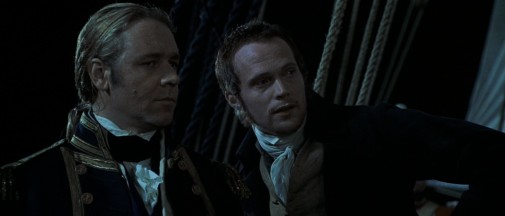
The relationship between the two men is bracingly complex and devoid of clichéd contrivance. Their conversations are an open meeting of minds, be it a dinnertime jest or music lesson musings. Furthermore, while we might think the military man would be more prone to verbal aggression, it's the doctor's words that cut deepest. When they disagree, Crowe performs the quarrel with the reticence of someone ashamed of his anger, bound by stubborn duty. On the other hand, Bettany allows the gentle scientist to speak hurtful words with a glimmer of feckless cruelty. There's never any deliberate meanness to either man, but, as all close friends do, they can injure the other's soul with unknowing precision.
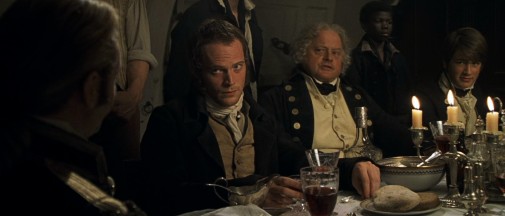
What most excites me about the two men's interactions is how complementary the characters are. You'd expect a film like Master & Commander to take sides, but Weir's creation seems to argue that the two individuals and their often-antithetical choices are better in uncertain harmony than in isolated hegemony. Neither is seen as entirely right or wrong, with Maturin often acting as a conscience, a devil's advocate, a needed opponent to his captain's sense of order. Such dynamic extends to several aspects of the film's form and tone, even its sound design. In contrast to Crowe's militaristic baritone, there's something almost radical to Bettany's soft-spoken register. When conversing with the captain, deep within the noisy belly of the Surprise, his dialogue is nearly drowned out.
In this canny gesture, Bettany invites the audience to come closer, to pay attention to him by denying vociferous demonstration, conveying a sense of intimacy with the spectator. At the same time, this vocal approach serves to signal Maturin as a man not accustomed or inclined to bellow out orders. His realm is the close quarters of the operation room rather than the upper deck battlefield. He's a man of science rather than war, someone vaguely displaced in the naval milieu of the film. By simply not raising his voice, Bettany tells us multitudes about the man he's playing and the life he's lived outside the movie's narrative.
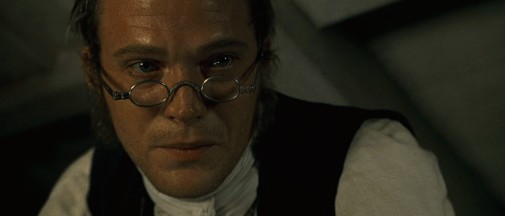
The entirety of Bettany's performance is littered with such perfect actorly choices, tiny details of expression, and reactions that breathe humanity into the war movie. Indeed, throughout it all, battle scenes included, he brings an edge of irony and dry wit to the ship's crew, offering tonal variation to the audience's perception of life on the sea. When we first see him, he's already exhausted and world-weary, tired eyes shining with the ghosts of many fallen men and memories of inconceivable bloodshed. However, when discussing practical matters with his captain, there's refreshing levity to his lines, a smidge of wry amusement, a stroke of gentleness amidst the brutality.
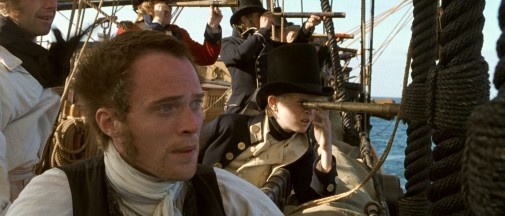
Early on, an amputation scene is brief and straightforward, with a couple of close-ups, no music, and surprisingly subtle sound effects. What most surprises is how Bettany's doctor gently assurances the young patient. He's delicate, even as his hands perform archaic surgery, overflowing with compassion. On a less surgical mode, there's a disarming openness to his glee at seeing the shores of the Galapagos islands. Such overt feeling is a prelude to steep disappointment, bruised betrayal, an onset of unexpected fury, and, eventually, a sad and contrite sort of acceptance regarding his lousy luck. It's pretty extraordinary to see Bettany run the gamut of sentiment without ever pulling the spotlight towards himself or defying the film's love of collective character study.
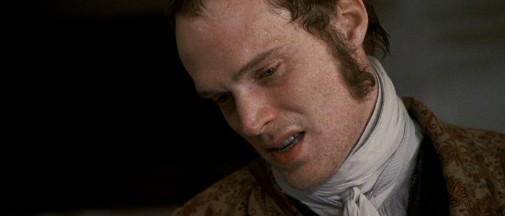
Before moving on to the 2003 awards trajectory, I'd like to highlight one final aspect of Bettany's work that particularly impressed me. Actors in period films often fall victim to their own sense of innate modernity. Some act as if people have always behaved the same, visibly struggling against language differences and uncomfortable costumes. Other performers portray the social and behavioral mores of yesteryear as some alien performance. In both instances, there's a judgment between actor and character that allows the audience to distance themselves from the action further.
In Master & Commander, there's a stark refusal of modernity and an embrace of the past. It's visible both in how the film regards the characters and how those same characters consider their world. The thespians of the cast, especially Bettany, avoid such mistakes by immersing themselves in the specificities of the period as imagined by Peter Weir. The Regency-era speech is delivered with naturality, and the rules of contemporary-minded personalities don't dictate the psychological interiority. As Maturin, Paul Bettany never feels like a 21st-century man playing dress-up in 19th-century fashions. Instead, he comes off as an 1805 person who found his way in front of a movie camera.
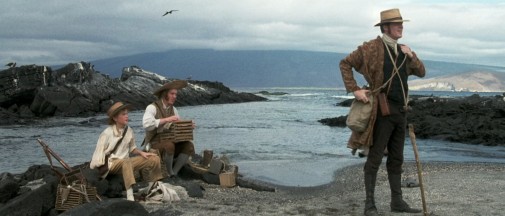
Bettany's lack of nomination is vexing, but, overall, the 2003 Oscars are an odd duck. Before the extended ballot era, it was unusual for films to get Best Picture nominations without a single one of their actors getting recognized. For example, from 1999 to 2008, only eight out of fifty Best Picture nominees got there with no additional nods for their cast. Three of those eight are from 2003 – Lord of the Rings: The Return of the King, Seabiscuit, and Master & Commander: The Far Side of the World. Curiously, their best chances at an acting nomination were in the Best Supporting Actor Oscar race. Unfortunately, internal competition doomed two of those flicks.
Both Seabiscuit and The Return of the King had multiple actors gaining traction and a modicum of precursor attention. In the end, the lack of consensus probably cost them a nod. That's not the case with Paul Bettany in Master & Commander. He got nominations from the Critics Choice Awards and the BAFTAs, as well as much critical acclaim. Still, AMPAS preferred five other men. They were Alec Baldwin in The Cooler, Benicio Del Toro in 21 Grams, Djimon Hounsou in In America, Tim Robbins in Mystic River, and Ken Watanabe in The Last Samurai. Robbins, the only nominee from a Best Picture contender, ended up winning. To this day, Bettany has never been nominated.
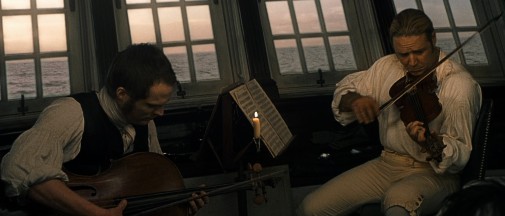
Master & Commander: The Far Side of the World is available to stream on Amazon Prime Video.